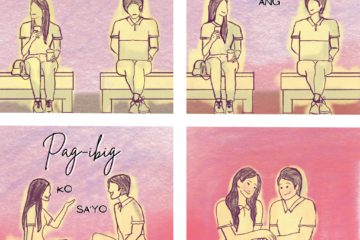by VON ZYRON P. ALIMORONG

I HAVE sat at many tables and walked many roads, accompanying two lovers and seen them drown in love. I have also seen many of these lovers grow apart, often turning into bad memories or to strangers—and me, their sole witness. The lucky ones would remain acquainted. The usual ones, however, would act like ghosts toward one another. Their reasons vary for becoming like so. But in most of them, the other half would suddenly give up swimming in a sea as vast and dangerous as love. It takes a certain courage to remain in that sea. So for some, the shore seems to be a better place to remain in. And in returning to safer shores, they would leave their partner floating all alone. Their partner, who once knew how to swim and where to go, would be lost and confused, stranded only with their thoughts.
Love is something I have seen and known from all distances.
In any of the public places I visit, I would see a pair or two, perhaps at the start of their relationship or towards a sadder end, and I would casually observe them during my breaks. I have developed a frighteningly accurate sense of whether a date is about to go right or is about to go very wrong. Even if it is in a public space, when something is going terribly wrong, most couples I have accompanied could not wait until they got home to resolve their issues.
There is something I find funny about this. There have been many instances when I seemed to have blipped out of existence in a couple’s consciousness, and they would act as they would when they are alone. When the clanking of my keys snaps me back to existence, they will realize again that they are not alone. Their demeanor would change. One of them would turn meek, and the other would talk about something else—preferably something I could join in on and contribute to.
Third-wheels (not the annoying ones, anyway) are, in many ways, like Schrodinger’s cat. Their state of existence will only be truly verified if they are actively observed.
There are those, however, who intentionally bring me to their date to prevent any quarrels from happening. Of course, I am often unaware that this is my true purpose. Once, I found it odd that an acquaintance of mine said I would be treated to any food I wanted as long as I joined them on their date. “Seems like a good deal,” I thought. I get to bond with them; I get to eat without having to spend anything; I get to have a nice break—so I said, “Yes, where is it, I am on my way, booking Angkas right now, save me a seat.”
I thought I was only there for friendship and food. No one informed me that the deal included some roles and responsibilities. Whenever something like this happens, I feel a tension that seems to slowly bind my neck to my bowl throughout lunch. So I would throw a joke or two, keep their minds away from angry thoughts, and, if successful, maybe prevent a shouting match inside a fast-food chain. If unsuccessful, it would be like rewatching that scene in Marriage Story, but in real life and without the wall-punching or the sudden making of comparisons to their parents.
Not every couple I accompany ends up at either extreme of the “affection scale.” There are those who enjoy casual bonding: reading books, small talk, bird-watching, vehicle-watching, and people-watching. Just the usual get-together with friends, except two are lovers and one is an unnecessary addition. I enjoy this kind of third-wheeling, which is what I mostly experience. When these more calm and quiet lovers reached a sudden end, however, they seemed to take with them the space they had taken in me. I have seen their love blossom in a way sweeter than a rose unfolding its petals in late May. I only have the best wishes for them. The loveliest summer never ends when these kinds of lovers are around. What then is this unannounced entry of a harsh and biting winter? I cannot even begin to fathom how it must have felt to the ones left alone, to the ones who wanted to fight a little bit more for a little bit longer.
On many occasions, these lovers’ displays of affection would draw out from me a variety of emotions. Yet, when their love begins to dry right before my eyes, it leaves only a bitter aftertaste.
Life is indeed that grand Character that encompasses all existence—the Mother of All Things; The Gardener of Love’s Garden—and we have been the roses that bloom upon Her plant boxes. It is in her garden that our stories of summers and winters flourish—and greatly and genuinely do we flourish in love, and arguably, only in love.
So is it not too cruel of Life to make fun of genuine things, turning such a beautiful thing that seems to bloom out of Life itself into something that could only remain in cursed memories and painful pasts?
But nothing could be done. We are only readers of these stories. No one could ever change the ending except the writers themselves. F



